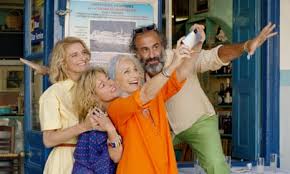Two Tickets to Greece reviewed

Deborah Ross
Athens: Within the first five minutes of Two Tickets to Greece you know what it is and where it’s going. It’s based on what I call ‘the hate-love formula’ with its in-built guarantee: any two people who can’t stand each other at the outset of a film will have bonded by the end. In this instance it’s a womance featuring two middle-aged women who were inseparable at school but haven’t seen each other for 30 years.
One is Blandine who, as an adult, is reserved and buttoned-up, while the other, Magalie, is – gulp – a ‘free spirit’. (Run, Blandine; run like the wind!) But while the film is predictable, it has a certain French verve, excellent performances and doesn’t take it out of you. It also features a third-act turn from Kristin Scott Thomas who seems to have entered the kaftan-with-statement-jewellery phase of her career. It’s a look which comes for us all.
Blandine is played by Olivia Côte, whose face comes in somewhere between Emily Maitlis and Haydn Gwynne, and is so fascinatingly expressive and watchable it does help you forgive the film’s more formulaic sins. But, for the moment, Blandine is not much fun. Her husband has left her and she’s sad, embittered and reclusive. Her university-age son wants her to start living again, so when she tells him about Magalie, and how they were once best friends, he tracks her down and arranges for the two to have dinner. This is quite the contrivance particularly as, in my experience, boys of that age can’t even arrange to pick up their own wet towels, but there you are.

The dinner goes badly from Blandine’s point of view as Magalie (Laure Calamy) is a hot mess, basically. She’s loud and impulsive and a freeloading blagger, but she tells her son it went great, to protect his feelings. So what does he do next? He books them two tickets to the Greek island of Amorgos. (This boy is a miracle. Maybe he does pick up his wet towels). It’s a place they had always dreamed of visiting together, having been inspired by Luc Besson’s The Big Blue.
Blandine plays by the rules, and wears beige and modest swimwear, while Magalie is all mini-skirts and platforms and tiny bikinis and is an agent of chaos. She flirts and ogles surfer dudes and so what if they’ve ended up on the wrong island with no place to stay, ‘we’ll sleep under the stars!’. She’s clearly the id to Blandine’s super-ego. (Thank you, Freud, you can take the rest of the day off).
I was definitely Team Blandine, but just as I was wondering why she doesn’t kill Magalie, or didn’t run like the wind when she had the chance, a terrific scene would come along. When Magalie dances behind a pillar, for example, the person who dances out of the other side is her as a teenager. We are seeing her as her younger self through Blandine’s eyes. What has happened between then and now?
The narrative meanders but, because you know something within the pair will shift and you want to be there for that, it also has propulsion. The shifting happens in the third act when they end up staying on another island with Magalie’s friend Bijou (Scott Thomas, giving off Meryl Streep in Mama Mia! vibes – but in a kaftan).
Scott Thomas brings heft, of course, and while there are the expected exposition dumps and truth bombs – what happened to Magalie?; why did she and Blandine fall out? – the quality of the performances ensure it’s a cut above your usual film of this type.
I won’t say how it concludes. You know me. I would never give away one of those endings that you already know.





